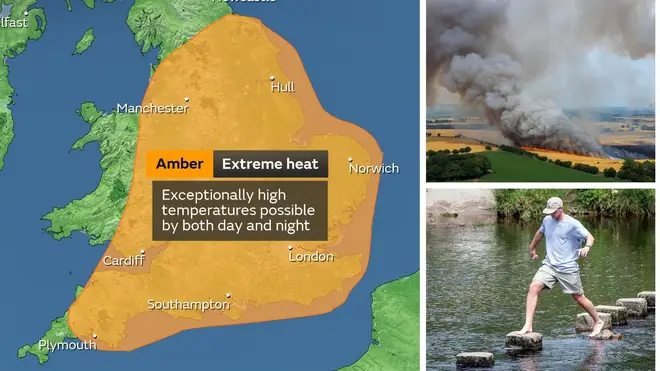
Election Night Live 10pm - 6am
13 July 2022, 11:44 | Updated: 13 July 2022, 11:50

An extreme heat weather warning has been extended for a third day as sweltering heat continues to take over the UK.
The warning for exceptionally high temperatures for much of England and Wales is now in place from Sunday until the end of Tuesday, with the hot spell expected to peak on Monday or Tuesday.
Temperatures look set to soar into the mid-30s or above at the beginning of next week - potentially surpassing the likes of Greece and Ibiza.
The Met Office said: "Population-wide adverse health effects are likely to be experienced, not limited to those most vulnerable to extreme heat, leading to potential serious illness or danger to life."
Widespread disruption, including road closures and cancellations and delays to rail and air travel are also possible.
Read more: First victim of heatwave as teen dies in canal as weather alert extended to Monday
Read more: UK braces for record-breaking 43C scorcher as heat warning issued
⚠️⚠️Amber Weather Warning updated⚠️⚠️
— Met Office (@metoffice) July 12, 2022
Exceptionally high temperatures across parts of England and Wales, now updated to extend into Monday#heatwave
Latest info 👉https://t.co/QwDLMfRBfs
Stay #WeatherAware ⚠️ https://t.co/p1ywfq2dPZ pic.twitter.com/y2GC5yqhBs
People are being encouraged to try to keep their homes cool, for example by closing blinds or curtains and keeping bedrooms well ventilated at night, drink plenty of fluids, avoid too much exercise, and stay out of the sun during the hottest part of the day.
The London Ambulance Service urged the public to only calling 999 in the event of a life-threatening emergency, reminding Brits to keep hydrated and stay out of the sun during the hottest periods of the day.
Meanwhile, the Royal Life Saving Society UK reiterated warnings about the dangers of trying to cool off in lakes, quarries, rivers and other waterways in the hot weather.
The extreme conditions can put a strain on the heart and lungs, with older people, those with pre-existing health conditions and young children particularly at risk.
It can cause dehydration, heat exhaustion or even heatstroke, and affect the ability to work or concentrate.
🤧 Have you been suffering with hay fever?
— Met Office (@metoffice) July 13, 2022
High pollen levels continue throughout the rest of this week, with occasionally very high counts across northern England pic.twitter.com/GNuj6OUinE
The heatwave is a result of hot air flowing to the UK from the continent.
Heatwaves have been made hotter, longer and more frequent by climate change, and experts have warned of the need to adapt homes and cities in the UK for a future of more intense - and deadly - summer heat.